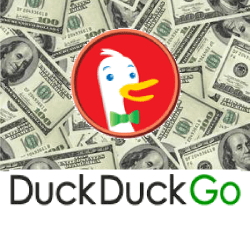
Duck Duck Go, which has a tiny percentage of the search engine market share in comparison to Google, doesn’t primarily base its results on algorithms. It also differs from other big search engines (Google, Bing, Yahoo) by not tracking its visitors the way that Google does.
[aditude-amp id="flyingcarpet" targeting='{"env":"staging","page_type":"article","post_id":341128,"post_type":"story","post_chan":"none","tags":null,"ai":false,"category":"none","all_categories":"business,entrepreneur,","session":"A"}']Since launching in 2008, Weinberg has resisted the urge to take on outside investment until there was a compelling reason to do so.
“So why now? At the end of last year I noticed that the search engine started to really click with a greater percentage of people in a way that it hadn’t before,” Weinberg said, noting the company’s zero-click info policy, privacy policy and goodies (a page of useful unit conversion and math tools).
AI Weekly
The must-read newsletter for AI and Big Data industry written by Khari Johnson, Kyle Wiggers, and Seth Colaner.
Included with VentureBeat Insider and VentureBeat VIP memberships.
Weinberg says the startup plans to use the money to hire new employees and expand its infrastructure.
Despite Duck Duck Go’s tiny market share of the overall search engine market, Union Square Venture’s Brad Burnham has a positive outlook for the startup. In a blog post about the investment deal, he writes:
“Our confidence in Gabriel and DuckDuckGo is informed by having watched the decline of Microsoft’s hegemony in the 90’s. Two things happened that fundamentally changed the game: a shift in venue and a shift in business model. The venue moved from the desktop to the web and the business model shifted from packaged software to open source. It turned out that the way to compete with Microsoft was to not to compete, at least not directly. The way to compete with Microsoft was to change the basis of competition. We invested in DuckDuckGo because we became convinced that it was not only possible to change the basis of competition in search, it was time to do it.”
The Paoli, Penn.-based startup will add Burnham to its board of directors. The new funding round also includes investments from Scott Banister, Jim Young, Jeff Miller, Joshua Schachter, Kal Vapuri, Joshua Stylman and Peter Hershberg.
VentureBeat's mission is to be a digital town square for technical decision-makers to gain knowledge about transformative enterprise technology and transact. Learn More